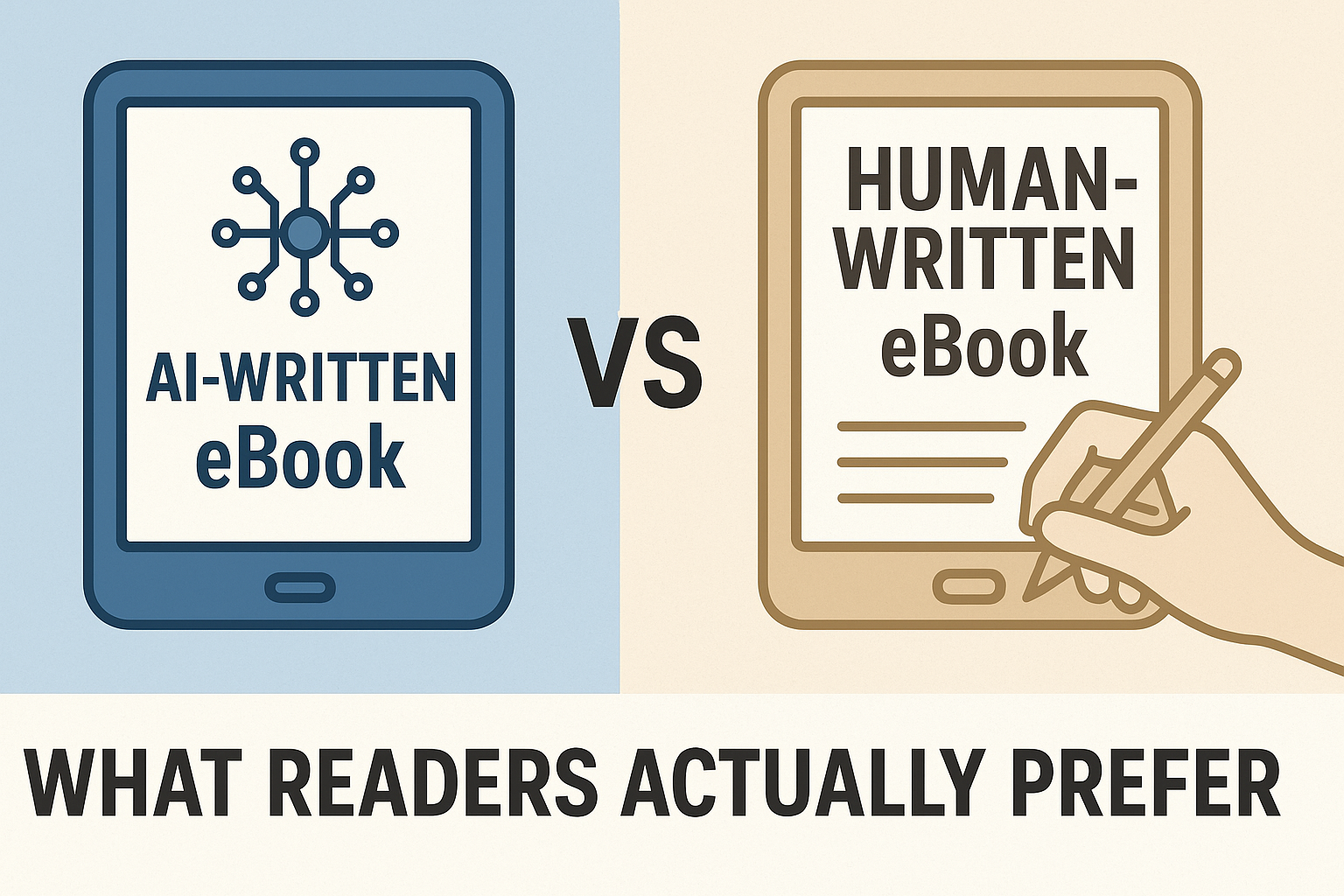With the rise of artificial intelligence in the creative space, authors, publishers, and marketers face a bold new question: do readers really care who wrote the book? In 2025, the tug-of-war between AI-written e-books and traditionally human-written works is at full throttle. What started as a curious experiment is now a legitimate publishing strategy—especially for entrepreneurs, busy executives, and influencers who hire a ghostwriting agency to produce high-quality content under their names.
At Book Planets, we’ve been watching this revolution unfold—and it’s clear: while AI can do a lot, human storytelling still holds something uniquely magnetic.
Why This Debate Matters to Readers and Authors Alike
The core of this discussion isn’t just about who or what is writing books. It’s about trust, authenticity, and connection. Readers want to know whether they’re absorbing an algorithm’s patterns or a person’s lived experience. Authors, on the other hand, are exploring what’s most efficient, marketable, and scalable.
With generative AI tools like ChatGPT, Claude, and Gemini reaching unprecedented levels of fluency and factual accuracy, many content creators wonder if the role of professional ghostwriters might be fading. Yet, reader behavior suggests otherwise.
How AI Is Transforming the Book Creation Process
AI has made writing books more accessible. Authors now use AI to:
- Draft outlines or brainstorm ideas
- Generate first drafts or summaries
- Rewrite or improve existing content
- Analyze tone, grammar, and readability
It’s fast. It’s cheap. And it’s smart—up to a point. But there’s a caveat.
While AI can mimic tone and structure, it often lacks emotional nuance, humor, depth, or real-world insight that only human writers—especially experienced non-fiction ghostwriters—can embed into a manuscript.
What Readers Really Think: Surveys and Trends
Recent surveys reveal a fascinating divide. According to a 2024 report by Publishing Insights Weekly:
- 72% of readers preferred not knowing if a book was written by AI or human, as long as it was engaging.
- However, 63% admitted they would trust a human-written non-fiction book more than an AI-generated one.
- Fiction readers were more open to AI content—especially in genres like sci-fi, romance, or thrillers.
The trust gap widens in business books and memoirs. Here, ghostwriting for business books is not only accepted—it’s often expected. Entrepreneurs seek to position themselves as thought leaders but don’t always have the time or writing skills to do so. That’s where a ghostwriting agency brings in human expertise that AI simply can’t replicate.
AI-Written Books: Strengths and Limitations
Let’s break down what AI does well—and where it misses the mark.
Strengths:
- Speed: An AI can draft 50,000 words in hours.
- Consistency: Grammar, structure, and tone remain uniform.
- Cost: Minimal expenses compared to hiring writers.
Weaknesses:
- Originality: AI can only remix existing data—it doesn’t invent.
- Emotion: Human empathy, intuition, and voice are lacking.
- Credibility: Non-fiction or self-help books without authentic backstories feel hollow.
This is especially critical when writing books meant to inspire trust, credibility, or emotional investment—areas where custom book writing by professionals still reigns supreme.
Human-Written Books: Why the Connection Endures
Despite AI’s advances, human-written books remain the gold standard. Why? Because readers don’t just consume words—they connect with the writer behind them.
Human authors (or their ghostwriters) offer:
- Personal experience and insights
- Unique storytelling techniques
- Real-world case studies and interviews
- Cultural nuance, historical context, and layered meaning
This becomes even more important in memoirs, leadership books, and inspirational non-fiction, where readers expect vulnerability, growth arcs, and depth—traits that cannot be faked by code.
The Role of Professional Ghostwriters in the AI Era
Far from being replaced, professional ghostwriters are actually seeing a rise in demand. Here’s why:
- AI-generated drafts require human polishing to feel authentic.
- Authors want to preserve their voice but lack the time to write.
- Ghostwriters bring publishing industry experience—knowing what sells, how to position a book, and how to write with purpose.
Premium ghostwriting packages now often include AI support for research and outlining—but the final touch is always human.
Case Study: AI vs Human in Business Books
Let’s compare a hypothetical AI-generated business book with one produced by a ghostwriting agency.
AI-Written Book:
- Title: “Scale Fast: 50 Business Hacks for Startups”
- Fast content, generic advice, references to well-known trends
- Clean writing but lacks any original founder stories or contextual insights
Ghostwritten Human Book:
- Title: “How I Built a 7-Figure Startup Without Burnout”
- Real anecdotes, founder’s journey, actionable frameworks
- Unique voice, humor, failures, and lessons readers connect with
Result? The human book resonates more deeply, generates better reviews, and often performs better in speaking engagements, media features, and long-term brand value.
Reader Experience: Emotional Intelligence Matters
Readers are savvy. They can tell when a story flows naturally versus when it feels like a machine cobbled it together. Human-written books hit emotional beats—pacing, drama, humor, suspense. They evoke feelings, not just comprehension.
Even when AI tools are used in drafting, readers gravitate toward books that clearly express a unique, human perspective—something expertly delivered by non-fiction ghostwriters.
Ethics and Transparency: Should Authors Disclose AI Use?
This is where opinions split. Some argue transparency builds trust, while others believe AI is simply a tool—like spellcheck or Grammarly—and doesn’t need to be disclosed.
At the very least, if a book claims to be based on personal experience, it should reflect lived reality, not fabricated content. Here’s where custom book writing shines—authors work closely with ghostwriters to ensure accuracy, honesty, and alignment with their voice.
The Future: Hybrid Writing Models Are Winning
Rather than viewing AI and human authorship as mutually exclusive, many publishing professionals are embracing a hybrid model:
- AI handles the outline, early drafts, and research
- Human writers refine, add insight, and inject creativity
This collaboration ensures faster production without sacrificing depth, trust, or engagement.
Conclusion: Readers Still Crave the Human Element
In a world increasingly flooded with content, what truly stands out isn’t speed or volume—it’s connection. While AI can create competent e-books, the human heart behind a story is what resonates. Whether working with non-fiction ghostwriters or writing solo, authors aiming for trust, transformation, or traction must keep readers at the center.
So, when it comes to AI-written vs human-written e-books, the verdict is clear: readers prefer truth, authenticity, and storytelling—qualities that only human minds can truly master.

